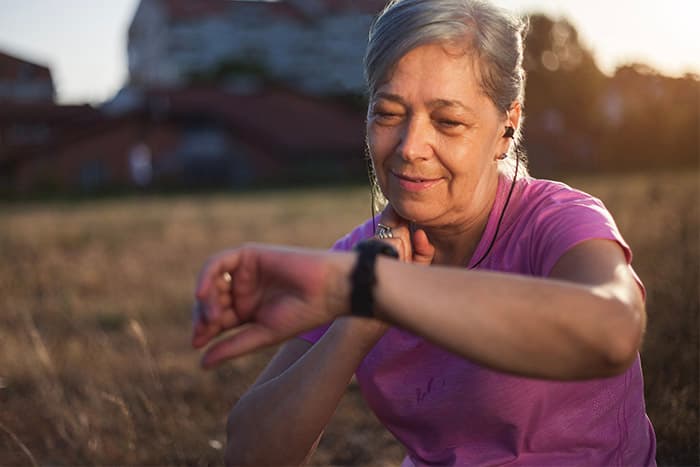A target heart rate is a key indicator of your energy and effort expenditure during a workout. This means that having a target heart rate in mind when you exercise can help you tailor your routine to specific fitness goals.
However, target heart rates will vary by age, so seniors should have specific considerations when monitoring their heart rate during exercise. In this article, we’ll explore the cardiovascular benefits of exercise for older adults and identify the ideal heart rate they should aim for during their workouts.
Cardiovascular Benefits of Exercise for Seniors
As we age, maintaining heart health becomes increasingly important, and regular exercise plays a crucial role in promoting cardiovascular well-being for seniors. Here’s a look at some of the benefits of exercise as an older adult:
Overall Heart Health: Regular exercise can help lower blood pressure and improve circulation. Aerobic activities, such as walking, swimming, or cycling, strengthen the heart muscle, allowing it to pump blood more effectively. This increased efficiency can lead to a lower resting heart rate which is vital for overall cardiovascular health.
Reduced Risk of Heart Disease: Exercise can help lower cholesterol levels and reduce the buildup of plaque in the arteries, lowering the risk of heart attack and stroke.
Enhanced Blood Flow: Exercise increases blood flow throughout the body, delivering more oxygen and nutrients to the organs and muscles.
Weight Management: Exercise also helps manage weight, a critical factor in preventing heart disease and other chronic conditions. By burning calories and building muscle, seniors can maintain a healthy weight, reducing the strain on their hearts.
Positive Impact on Mental Health: Exercise has a positive impact on mental health, which is closely linked to heart health. Physical activity releases endorphins, the body's natural mood lifters, reducing feelings of anxiety and depression. This emotional well-being can lead to healthier lifestyle choices, such as better nutrition and adherence to medication regimens, which are essential for heart health.
Target Heart Rates for Seniors Who Exercise
To understand the ideal target heart rate for seniors who exercise regularly, it’s important to first review the difference between resting heart rate and target heart rate. Your resting heart rate is the rate your heart beats when you’re at rest, while your target heart rate is the rate you want to achieve during mild, moderate, or intense exercise. Most adults will have a resting heart rate of 60 to 100 beats per minute (BPM).
Instead, the target heart rate for older adults who exercise regularly with moderate-to-vigorous physical activity would look like:
60-year-olds: 80-136 BPM
65-year-olds: 78-132 BPM
70-year-olds: 75-128 BPM
Of course, this can depend on a variety of factors including overall health and fitness, pre-existing conditions, and workout regimens. For a more exact understanding of their target heart rate, seniors should consult their physician or cardiovascular specialist.
Learn More About Senior Health and Wellness With The Medicare Helpline
Regular exercise and maintaining good cardiovascular fitness are two elements of healthy aging for seniors. If you’re looking for more ways to stay healthy and fit as you age, The Medicare Helpline is here to help. Check out our Lifestyle articles for additional information and resources on caring for your cognitive and physical health to support your independence and longevity.
More Lifestyle Articles
